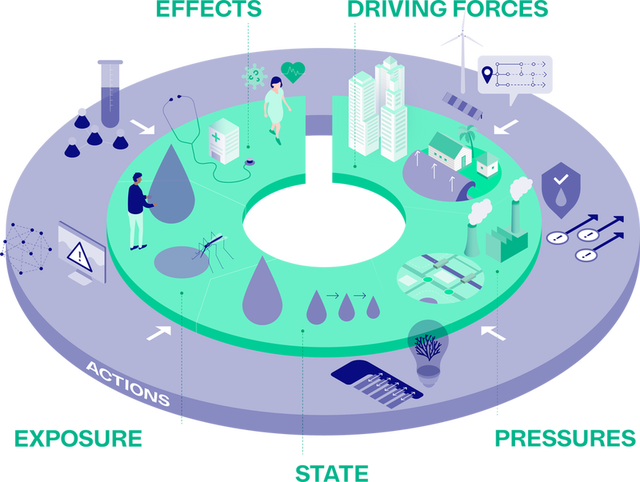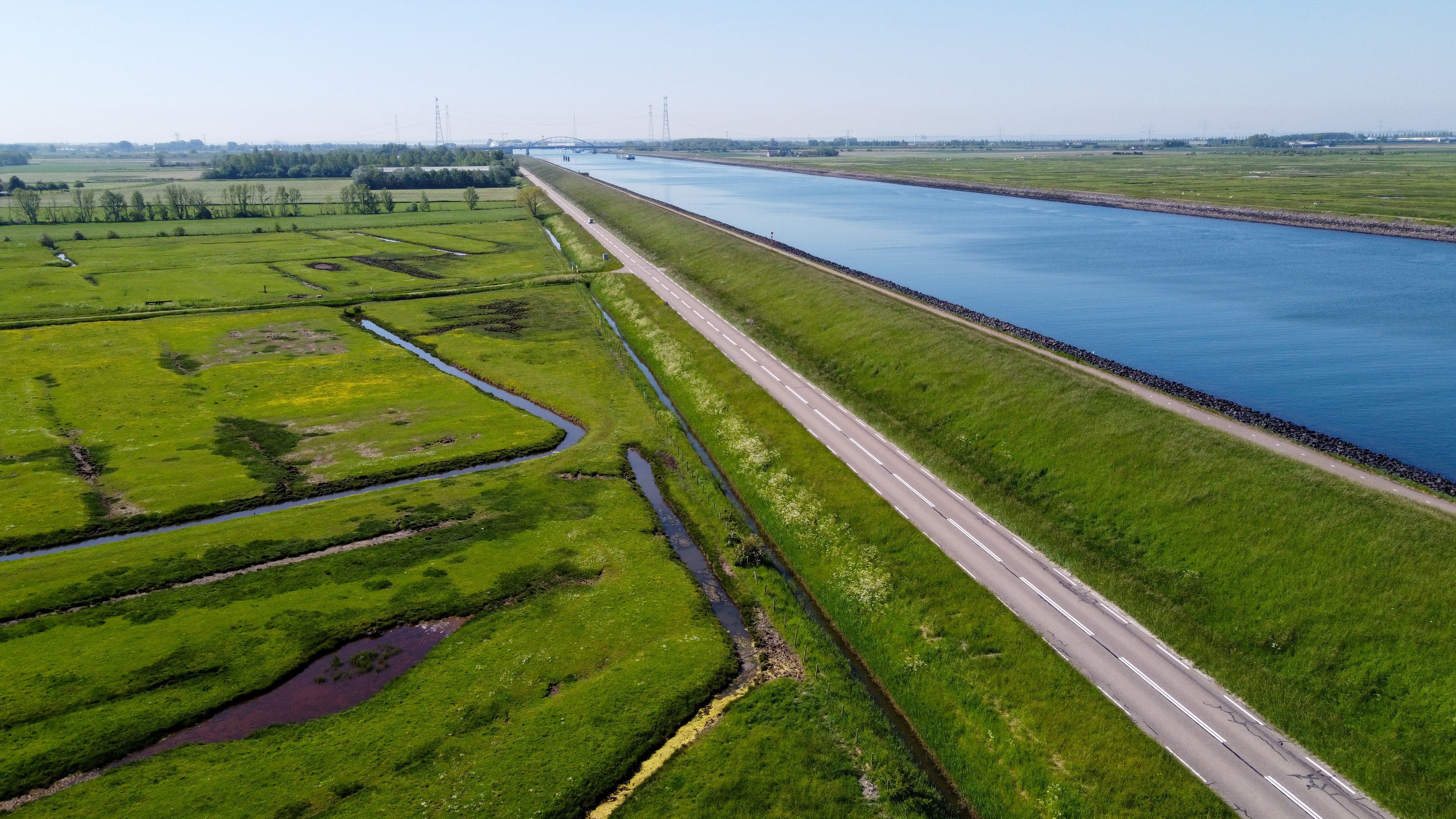Infographic
Water and Health
Climate change and urbanisation affect human health. They change the environment and influence our water quantity and quality. With its holistic knowledge of water system and subsurface, Deltares works on smart solutions, innovations and applications for people, environment and society.
Facts & Figures
do not have access to safely-managed drinking-water services
7 of the WHO’s top ten chemicals of major public health concern are found in water:
Worldwide, more than
die every year from diseases caused by chemicals related to poor soil quality
Mental health
Disasters can have a major impact on mental health. Such profound events can trigger or exacerbate mental conditions such as depression or Post Traumatic Stress Disorder.
By 2025, half of the world’s population could be living in areas facing water scarcity
Climate change aggravates the burden of vector-borne diseases
Vaccination and treatment are inadequate or not available
Chikungunya virus
• transmitted via Aedes mosquitoes
• spread throughout the tropical world and several subtropical areas since 2004
Dengue
• transmitted via Aedes mosquitoes
• 100-400 million infections annually
• mostly in urban and semi-urban areas
West Nile Fever
• transmitted via Culex mosquitoes
• birds can carry the disease
Each year, unsafe or inadequate water quality leads to
deaths from infectious diseases worldwide
Among the top ten threats to health, food production and social development. 1.3 million deaths are directly related to antibiotic resistance (2019). 10 million deaths per year are expected by 2050.
More than
50
severe floods in 2021
Infographic
Water and Health
Climate change and urbanisation affect human health. They change the environment and influence our water quantity and quality. With its holistic knowledge of water system and subsurface, Deltares works on smart solutions, innovations and applications for people, environment and society.

Driving forces
Climate change
Climate change creates more extreme weather and leads to changes in land use. Water shortages, floods and high temperatures threaten human health and increase the risk of illness and death. This requires adaptations.
Driving forces
Urbanisation
World population growth levels off, but more people live close together in cities. In these circumstances, disease can spread more easily. Water quality is threatened by increased solid waste and sewage. As more areas are paved, the chances of heat stress increase.
Pressures
Emissions
Production of food and goods generate high levels of waste, as do urban areas. Pollutants are often discharged into surface water or enter the soil and groundwater. In many places, groundwater is an important source of drinking water.
Pressures
Infrastructure
Dams and dikes are used to prevent water shortages and floods, or to generate energy, but they can have negative effects on water quality and ecology. Adequate housing, passable roads, reliable electricity, clean and safe drinking water, sanitation and other facilities can protect people.
State
Water quantity
Too much or not enough water has consequences for human health as well as for nature. Both can lead to a lack of safe drinking water, poor hygiene, food scarcity, migration and conflicts.
State
Meer informatie
Infographic: Water en gezondheid
Water quality
Using poor quality (ground)water poses health risks. When the local ecology is disrupted, harmful organisms can thrive and spread disease.
Exposure
Water use
Drinking, bathing, or other uses of poor quality water, expose people to pollution and pathogens.
Exposure
Meer informatie
Infographic: Water en gezondheid
Indirect transmission
Disturbed water systems can become breeding sites for mosquitoes and rats that may transmit disease.
Effects
Human health
Lack of water and water of poor quality will eventually lead to various health impacts, such as injury, disease, lack of basic necessities and stress. Conversely, clean and safe water can make us healthier.
Effects
Health services
Hospitals, doctors and other health professionals must deal with the effects of water-related complaints.
Actions
Monitoring
Monitoring water quantity and quality increases understanding of the influences and processes involved. With this, timely precautions can be taken, such as early warnings for pollution events or floods.
Actions
Alliances
Deltares’ knowledge of water systems complements medical expertise. Together, we can reduce water-related health risks.
Actions
Early warning
Deltares makes global (early warning) models for flooding, water shortages and water quality. Early warnings about flooding or pollution can greatly reduce the health effects of climate change and other disasters.
Actions
Modelling
With models we can imitate reality without having to measure everything precisely. By applying various scenarios, the effect of interventions can be simulated and evaluated.
Actions
Safety plans
Worldwide, safety plans make water systems more resilient to climate change. This will benefit human health.
Actions
Disaster management
Although floods and other disasters cannot always be prevented, governments are better prepared to deal with their effects by having multi-hazard plans. These give an overview of actions that need to be carried out in the case of disasters, resulting in fewer negative health effects.
Actions
Integrated water resources management
Integrated water and land management for food, drinking, energy, ecosystems and other uses is aimed at maximising economic and social welfare. With holistic knowledge of water systems, human health risks can be taken into account in water and land management.
Actions
Nature-based solutions
Nature-based solutions target major challenges, such as climate change, disaster risk reduction, food and water security, biodiversity and human health. Implementing these solutions make the areas climate resilient and will support the health of people and nature.
Actions
Policy advice
With its specific knowledge on water and subsurface in relation to human health, Deltares is well placed to advise on policy at various levels.
Actions
Energy transition
The transition from fossil fuels to sustainable energy, while necessary to mitigate climate change, has its own health risks. Advice, for example on solar panels, wind turbines or geothermal energy, includes effects on biodiversity and (ground)water quality to prevent health risks.
Facts & figures
do not have access to safely-managed drinking-water services
7 of the WHO’s top ten chemicals of major public health concern are found in water:
Among the top ten threats to health, food production and social development. 1.3 million deaths are directly related to antibiotic resistance (2019). 10 million deaths per year are expected by 2050.
Worldwide, more than
die every year from diseases caused by chemicals related to poor soil quality
Mental health Disasters can have a major impact on mental health. Such profound events can trigger or exacerbate mental conditions such as depression or Post Traumatic Stress Disorder.
By 2025, half of the world’s population could be living in areas facing water scarcity
Climate change aggravates the burden of vector-borne diseases
Vaccination and treatment are inadequate or not available
Chikungunya virus
• transmitted via Aedes mosquitoes
• spread throughout the tropical world and several subtropical areas since 2004
Dengue
• transmitted via Aedes mosquitoes
• 100-400 million infections annually
• mostly in urban and semi-urban areas
West Nile Fever
• transmitted via Culex mosquitoes
• birds can carry the disease
Each year, unsafe or inadequate water quality leads to
deaths from infectious diseases worldwide
More than
50
severe floods in 2021
Driving forces
Climate change
Climate change creates more extreme weather and leads to changes in land use. Water shortages, floods and high temperatures threaten human health and increase the risk of illness and death. This requires adaptations.
Driving forces
Urbanisation
World population growth levels off, but more people live close together in cities. In these circumstances, disease can spread more easily. Water quality is threatened by increased solid waste and sewage. As more areas are paved, the chances of heat stress increase.
Pressures
Emissions
Production of food and goods generate high levels of waste, as do urban areas. Pollutants are often discharged into surface water or enter the soil and groundwater. In many places, groundwater is an important source of drinking water.
State
Water quantity
Too much or not enough water has consequences for human health as well as for nature. Both can lead to a lack of safe drinking water, poor hygiene, food scarcity, migration and conflicts.
State
Water quality
Using poor quality (ground)water poses health risks. When the local ecology is disrupted, harmful organisms can thrive and spread disease.
Pressures
Infrastructure
Dams and dikes are used to prevent water shortages and floods, or to generate energy, but they can have negative effects on water quality and ecology. Adequate housing, passable roads, reliable electricity, clean and safe drinking water, sanitation and other facilities can protect people.
Exposure
Water use
Drinking, bathing, or other uses of poor quality water, expose people to pollution and pathogens.
Exposure
Indirect transmission
Disturbed water systems can become breeding sites for mosquitoes and rats that may transmit disease.
Effects
Human health
Lack of water and water of poor quality will eventually lead to various health impacts, such as injury, disease, lack of basic necessities and stress. Conversely, clean and safe water can make us healthier.
Effects
Health services
Hospitals, doctors and other health professionals must deal with the effects of water-related complaints.
Actions
Monitoring
Monitoring water quantity and quality increases understanding of the influences and processes involved. With this, timely precautions can be taken, such as early warnings for pollution events or floods.
Actions
Alliances
Deltares’ knowledge of water systems complements medical expertise. Together, we can reduce water-related health risks.
Actions
Early warning
Deltares makes global (early warning) models for flooding, water shortages and water quality. Early warnings about flooding or pollution can greatly reduce the health effects of climate change and other disasters.
Actions
Modelling
With models we can imitate reality without having to measure everything precisely. By applying various scenarios, the effect of interventions can be simulated and evaluated.
Actions
Safety plans
Worldwide, safety plans make water systems more resilient to climate change. This will benefit human health.
Actions
Disaster management
Although floods and other disasters cannot always be prevented, governments are better prepared to deal with their effects by having multi-hazard plans. These give an overview of actions that need to be carried out in the case of disasters, resulting in fewer negative health effects.
Actions
Integrated water resources management
Integrated water and land management for food, drinking, energy, ecosystems and other uses is aimed at maximising economic and social welfare. With holistic knowledge of water systems, human health risks can be taken into account in water and land management.
Actions
Nature-based solutions
Nature-based solutions target major challenges, such as climate change, disaster risk reduction, food and water security, biodiversity and human health. Implementing these solutions make the areas climate resilient and will support the health of people and nature.
Actions
Policy advice
With its specific knowledge on water and subsurface in relation to human health, Deltares is well placed to advise on policy at various levels.
Actions
Energy transition
The transition from fossil fuels to sustainable energy, while necessary to mitigate climate change, has its own health risks. Advice, for example on solar panels, wind turbines or geothermal energy, includes effects on biodiversity and (ground)water quality to prevent health risks.

